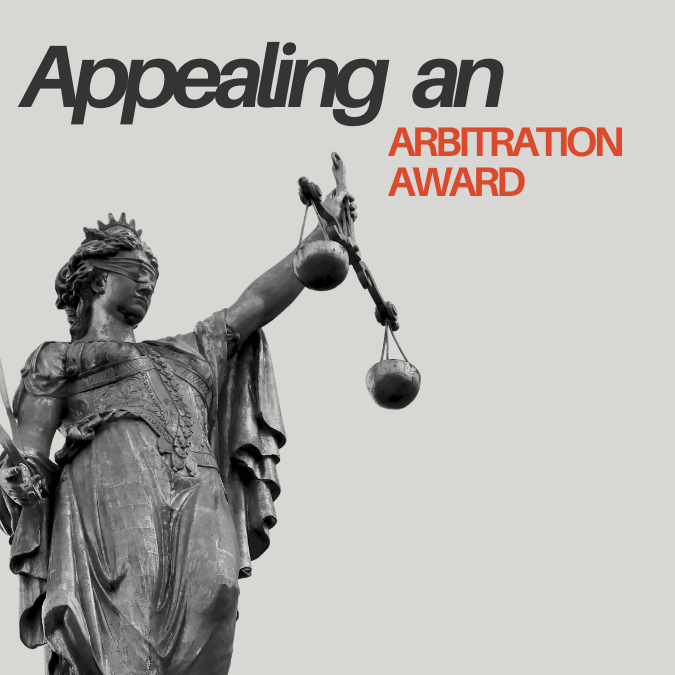Arbitration is described as an alternative to traditional court litigation, offering businesses a cost-effective and flexible way to resolve disputes while maintaining professional relationships.
In the UAE, the arbitration process has been refined to align with global best practices, thanks to Federal Law No. 6 of 2018 on Arbitration (“Arbitration Law”) and its subsequent amendments.
This legal framework ensures a streamlined, transparent, and enforceable approach to resolving conflicts outside conventional courtrooms.
Under Article 1 of the Arbitration Law, arbitration is defined as a legally regulated process where disputes are settled through binding decisions by an impartial Arbitral Tribunal, based on the mutual agreement of all parties involved.
The law further emphasizes the importance of an Arbitration Agreement, a formal contract specifying the parties’ intention to arbitrate either before or after a dispute arises.
But how to appeal an arbitration award, and can you challenge the decision against the enforcement of awards?
This is what we will discuss in this article together, so please keep reading!
Binding Nature of Arbitration
An arbitration award issued by an arbitral tribunal under Article 52 of the UAE Arbitration Law is legally binding on the involved parties.
Arbitration awards have the nature of res judicata, that is, a final choice or adjudication by a competent authority, and they enjoy the same enforceability as a judgment from a court. The arbitration award is enforced by the parties going through the ratification process via the UAE courts.
Arbitration awards are made to be final and conclusive, but often you will hear questions about whether an award can be challenged, i.e., can arbitration be appealed? The answer is less simple, but the options to appeal arbitration awards are restrictively limited. Awards can only be challenged on certain legal grounds, including process irregularities, lack of jurisdiction, or public policy reasons. These exceptions are generally a safety mechanism to ensure fairness and compliance with the law during the arbitration process.
Grounds for Challenging an Arbitration Award
Article 53 of the UAE Arbitration Law outlines the legal grounds on which an arbitration award can be challenged.
These provisions aim to ensure the validity, fairness, and adherence to procedural norms in arbitration proceedings.
Grounds Based on Procedural and Legal Deficiencies
- Lack of Arbitration Agreement
- No valid arbitration agreement exists, or the agreement is declared void and unenforceable.
- Incapacity or Incompetence
- One of the parties was legally incompetent or under incapacity at the time the arbitration agreement was concluded.
- A party lacks the legal capacity to dispose of the disputed right under the applicable law.
- Failure to Present a Case
- A party was unable to present its case due to:
- Not receiving proper notice of the arbitrator’s appointment or the arbitral proceedings.
- A breach of due process by the arbitral tribunal.
- Other reasons beyond the party’s control.
- A party was unable to present its case due to:
Read more about: what you need to know about uae arbitration law?
Grounds Related to Substantive Issues and Proceedings
- Exclusion of Parties’ Choice of Law
- The arbitral award disregards the law chosen by the parties to govern the dispute.
- Irregularities in Arbitral Proceedings
- Procedural irregularities that affected the arbitral award.
- The award was not issued within the specified time frame.
- Matters Beyond the Scope of Arbitration
- The award includes decisions on issues not covered by the arbitration agreement or exceed its scope.
- Improper Tribunal Composition
- The composition of the arbitral tribunal or the appointment of arbitrators was not in accordance with the Arbitration Law or the parties’ agreement.
Read more about: arbitration clauses in subcontract agreements

Grounds Where the Court Can Act on Its Initiative
In addition to the above, the UAE courts can set aside an arbitral award on the following grounds:
- Non-Arbitrable Subject-Matter
- The dispute involves issues that cannot be resolved through arbitration.
- Conflict with Public Order or Morality
- The arbitral award contradicts the public order and morality of the UAE.
These provisions safeguard the integrity of the arbitration process while maintaining legal compliance with UAE law.
Learn more about the new key changes under the federal uae arbitration award
Procedure for Appealing an Arbitration Award
Once an arbitral award is issued, it must first undergo ratification by the Court before it can be enforced.
The process for challenging an arbitration award is structured to ensure fairness while maintaining the finality of the arbitration process. And yet in accordance with challenging the decision, here come other procedures that can be taken into consideration, depending on the case and status of the motion:
-
Appeal to the Cassation Court
If the Court rejects the challenge or sets aside the award, its decision can be appealed to the Cassation Court. Such an appeal must be filed within 30 days from the date of the judgment.
Learn more about: How can disputes be resolved through settelmets during arbitration in uae?
-
Provisions for Enforcement and Global Relevance
The UAE Arbitration Law has introduced several measures to streamline the enforcement of arbitral awards within the country:
- It facilitates the efficient enforcement of domestic arbitral awards, aligning with international best practices.
- The law also permits the direct enforcement of foreign arbitral awards, making the UAE a globally competitive jurisdiction for businesses and international arbitration.
Read more about: maritime arbitration in dubai – what contracts can be subjected to arbitration?
Last words
The UAE Arbitration Law provides a comprehensive framework for managing arbitration proceedings.
And with all the regulations available, choosing the best arbitration lawyers in dubai is a must when you come across such legal matters!
Having said that, Contact Khairallah Advocates & Legal Consultants and benefit from our free 30-min legal consultation.
*Disclaimer: our blogs, law updates and FAQ’s are freely distributed for educational purposes and to showcase recent updates and regulations in the UAE’s framework.
If you have any questions and need an assistance, contact us at our number or book an appointment online.



